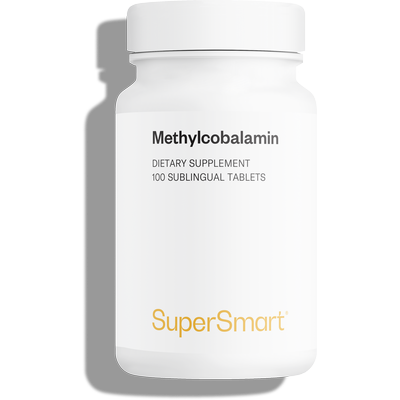B12 deficiency: symptoms, causes and what to do about it
Persistent fatigue, concentration problems, depressed mood... Vitamin B12 deficiency causes symptoms that can go unnoticed. What are the signs to look out for and how can they be remedied effectively?

What is vitamin B12, and what is it used for?
Vitamin B12 (or cobalamin) is a water-soluble vitamin that is essential for the body to function properly. It is involved in many fundamental biological processes, which explains why a deficiency can have multiple repercussions.
Vitamin B12 contributes to normal energy metabolism and the normal metabolism of homocysteine (an amino acid produced naturally by the body during protein metabolism).
It also plays a key role in the proper functioning of the nervous system and contributes to normal psychological functions. It is also essential for the production of healthy, functional red blood cells.
With its action on energy production, tissue oxygenation and nerve function, vitamin B12 helps to reduce feelings of tiredness and exhaustion.
B12 also supports the body's natural defences, taking part in DNA synthesis (it contributes to the process of cell division) and the normal functioning of the immune system.
The special feature of vitamin B12 is that it is found almost exclusively in animal products: meat, offal, eggs, dairy products, fish and seafood, etc. This is why populations that eat little of this type of food are particularly exposed to the risk of deficiency.
What are the symptoms of vitamin B12 deficiency?
A vitamin B12 deficiency can cause a wide variety of symptoms, sometimes appearing several months (or even several years) after the onset of the deficiency. If in doubt, it is always advisable to consult a doctor.
Unexplained chronic fatigue
As B12 is involved in the formation of red blood cells, a deficiency can lead to so-called ‘megaloblastic’ anaemia, characterised by red blood cells that are too large and inefficient.
The result is poor oxygenation of tissues, manifested by persistent fatigue, even at rest (1).
Mood and nervous system disorders
Vitamin B12 is essential for the nervous system to function properly. In our bodies, it plays a role in the synthesis of myelin, the protective sheath of the nerves.
A deficiency can lead to:
- mood disorders (irritability, mild to moderate depression) (2);
- cognitive problems (memory problems, difficulty concentrating);
- tingling in the feet and hands, numbness and even loss of feeling in the extremities (peripheral neurological symptoms) (3).
Weight loss and digestive problems
Loss of appetite or unexplained weight loss can also be signs of severe deficiency, particularly when the deficiency is linked to an underlying digestive disorder.
In some cases, glossitis (inflammation of the tongue) (4), constipation and diarrhoea, or abdominal pain may also be observed.
A diagnosis to be confirmed by a blood test
When in doubt, the diagnosis can only be confirmed by a blood test.
The doctor generally prescribes a vitamin B12 blood test, sometimes supplemented by other markers (such as homocysteine or methylmalonic acid, for a more accurate assessment).
What are the common causes of B12 deficiency?
Vitamin B12 deficiency can be caused by a number of factors, including inadequate intake, poor absorption or increased needs. Hence the importance of early detection, particularly in people at risk.
An unbalanced or restrictive diet
People who follow a strict vegetarian or vegan diet without supplementation are particularly at risk, as B12 is not found in plants (5).
Very restrictive diets, undernutrition and certain eating disorders can also lead to deficiencies.
Digestive disorders and absorption pathologies
Vitamin B12 needs a specific environment to be absorbed from the intestine. In particular, it depends on the secretion of intrinsic factor (IF), a protein produced by the stomach. In its absence, B12 cannot be absorbed.
Biermer's disease (or pernicious anaemia) is an autoimmune disease that prevents this production. It is one of the main causes of vitamin B12 deficiency (6).
The production of transport proteins and the absorption capacity of vitamin B12 also decline with age.
Other conditions, such as gastric atrophy, coeliac disease, Crohn's disease and certain bariatric surgeries (bypass) can also interfere with its absorption (7).
Long-term medication and treatments
Some long-term treatments can reduce the absorption of vitamin B12, in particular:
- proton pump inhibitors (PPIs) and antacids (8)
- certain antibiotics or anticonvulsants (anti-epileptics)
How can vitamin B12 deficiency be prevented or corrected?
Vitamin B12 deficiency can be effectively prevented or corrected with a suitable diet. In some cases, it is advisable to opt for targeted supplementation in the form of well-dosed, easily assimilated supplements.
Eat foods rich in B12
For omnivores, a varied and balanced diet is generally sufficient to cover the body's vitamin B12 requirements.
Foods rich in vitamin B12 (10) include:
- offal (liver, kidneys)
- red meat and poultry
- oily fish and seafood
- eggs and dairy products
However, in some cases, such as a vegan diet, malabsorption or chronic illness, these dietary intakes are not enough.
B12 supplementation: when is it necessary?
In high-risk situations (vegetarian or vegan diet, Biermer's disease, digestive surgery, the elderly, etc.), supplementation is strongly recommended (11).
Vitamin B12 is available in two main forms:
- Cyanocobalamin: effective and inexpensive, this is the most widely used synthetic form.
- Methylcobalamin: the most active form, directly usable by the body, it is particularly useful in cases of activation disorders or oxidative stress.
Vitamin B12 can be taken in the form of capsules, drops or tablets to be dissolved under the tongue.
- Discover the dietary supplement Methylcobalamin, formulated from pure, bioavailable methylcobalamin, for optimal assimilation on a daily basis.
In general, the doses used for prevention or maintenance vary from 500 µg to 1000 µg per day, well above the recommended daily intake (because digestive absorption of B12 is limited by saturation).
SUPERSMART ADVICE
References
- Tardy AL, Pouteau E, Marquez D, Yilmaz C, Scholey A. Vitamins and Minerals for Energy, Fatigue and Cognition: A Narrative Review of the Biochemical and Clinical Evidence. Nutrients. 2020 Jan 16;12(1):228. doi: 10.3390/nu12010228. PMID: 31963141; PMCID: PMC7019700.
- Sahu P, Thippeswamy H, Chaturvedi SK. Neuropsychiatric manifestations in vitamin B12 deficiency. Vitam Horm. 2022;119:457-470. doi: 10.1016/bs.vh.2022.01.001. Epub 2022 Mar 3. PMID: 35337631.
- Reynolds E. Vitamin B12, folic acid, and the nervous system. Lancet Neurol. 2006 Nov;5(11):949-60. doi: 10.1016/S1474-4422(06)70598-1. PMID: 17052662.
- JOHNSSON S. Anemia perniciosa utan anemi med monosymtomatisk glossit [Pernicious anemia without anemia and with glossitis as solitary symptom]. Nord Med. 1957 Aug 22;58(34):1227-30. Swedish. PMID: 13483974.
- Rizzo G, Laganà AS, Rapisarda AM, La Ferrera GM, Buscema M, Rossetti P, Nigro A, Muscia V, Valenti G, Sapia F, Sarpietro G, Zigarelli M, Vitale SG. Vitamin B12 among Vegetarians: Status, Assessment and Supplementation. Nutrients. 2016 Nov 29;8(12):767. doi: 10.3390/nu8120767. PMID: 27916823; PMCID: PMC5188422.
- Belghith A, Mahjoub S, Ben Romdhane N. Causes of vitamin B12 deficiency. Tunis Med. 2015 Nov;93(11):678-82. PMID: 27126423.
- Lewis CA, de Jersey S, Seymour M, Hopkins G, Hickman I, Osland E. Iron, Vitamin B12, Folate and Copper Deficiency After Bariatric Surgery and the Impact on Anaemia: a Systematic Review. Obes Surg. 2020 Nov;30(11):4542-4591. doi: 10.1007/s11695-020-04872-y. Epub 2020 Aug 12. PMID: 32785814.
- Hartman B, Donnelly-VanderLoo M, Watson T, O'Connor C, Madill J. Proton-pump inhibitor therapy and vitamin B12 status in an inpatient hospital setting. Appl Physiol Nutr Metab. 2016 Oct;41(10):1071-1076. doi: 10.1139/apnm-2016-0020. Epub 2016 Jun 23. PMID: 27690565.
- Tiwari A, Kumar Singh R, Satone PD, Meshram RJ. Deficiency in Patients With Type-2 Diabetes Mellitus. Cureus. 2023 Oct 26;15(10):e47771. doi: 10.7759/cureus.47771. PMID: 38034222; PMCID: PMC10688235.
- Watanabe F. Vitamin B12 sources and bioavailability. Exp Biol Med (Maywood). 2007 Nov;232(10):1266-74. doi: 10.3181/0703-MR-67. PMID: 17959839.
- Markun S, Gravestock I, Jäger L, Rosemann T, Pichierri G, Burgstaller JM. Effects of Vitamin B12 Supplementation on Cognitive Function, Depressive Symptoms, and Fatigue: A Systematic Review, Meta-Analysis, and Meta-Regression. Nutrients. 2021 Mar 12;13(3):923. doi: 10.3390/nu13030923. PMID: 33809274; PMCID: PMC8000524.
3 Days
Efficiency and speed
Efficiency and speed
Cuccie
5 Days
GOOD BRAND IN FOOD COMPLEMENTS
GOOD BRAND IN FOOD COMPLEMENTS - SERIOUS WITH GOOD DOCUMENTS AND DETAILS SCIENTIST. AND SERIOUS HONNEST COMMERZIALISATION. I HAVE TRUST IN THEIR PRODUCTS.
FENOGLIO Guy
7 Days
Very good experience
Very good experience, the products arrived in time, in perfect condition and are good quality. Thank you.
GABI TIRCOCI
12 Days
very good expereince
very good expereince
Jelena Đaković
12 Days
Very good products.
Very good products.
Agnes BENDSAK
15 Days
Just OK
Just OK, ordering from company for many years and being safisfied
Lynn Mae
15 Days
Recomendo
Produtos encomendados são recebidos atempadamente e de acordo com o anunciado! Muito satisfeita!
Carla Sofia
16 Days
Everything is great!
Everything is great!
Jonas
21 Days
The delivery was fast and the product…
The delivery was fast and the product is great
SOMMARIVA Gianni
22 Days
Great service and lots of information
Great service and lots of information
Gabi
25 Days
Service Satisfaction
I’m satisfied with the service; it fulfilled what it set out to do.
Anfhony Abreu
28 Days
Original product and fast delivery
Original product and fast delivery. I haven't started it yet, but will do soon.
Vincenza Catania
30 Days
Good quality
Good quality. Good service.
Leonel Guzman
32 Days
Top!!!!!!!!
Top!!!!!!!!
Michael
34 Days
Excellent!
Products are great and delivered fast!
PARDINI Debora
of experience
your money back
##montant## purchase





